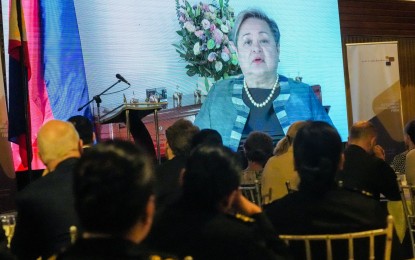PH hits China's revisionist, self-serving interpretation of law in SCS

By Joyce Ann L. Rocamora
MANILA - Foreign Affairs Secretary Ma. Theresa Lazaro described as "worrisome" China's continued rejection of the 2016 Arbitral Award, accusing the Asian power of pushing a "revisionist, self-serving interpretation" of international law in the South China Sea (SCS).
Lazaro made the remarks in a recorded message at a Stratbase ADRI forum, which commemorated the 9th anniversary of the South China Sea Arbitral Ruling in Makati City on Friday.
"Nine years hence, its legitimacy continues to be tested, challenged, and subverted, putting not only the Philippines maritime interests in peril, but also the regional stability and prosperity we are all working so hard to achieve," she said.
"It is worrisome that China has continued to reject the binding Arbitral Award and persists with illegal, coercive, and aggressive actions under cover of a revisionist, self-serving interpretation, and application of international law, particularly UNCLOS (United Nations Convention on the Law of the Sea)," she added, affirming the award will remain the "cornerstone" of Philippine maritime policy.
On July 12, 2016, the Arbitral Tribunal constituted under the 1982 Law of the Sea Convention dismissed as illegal Chinas so-called nine-dash line in the vital sea lane.
The invisible demarcation, which has since expanded into a 10-dash line, covers and lays territorial claim over a huge portion of the South China Sea, including the Philippines' exclusive economic zone in the West Philippine Sea.
The challenges are clear and the uncertainties remain in the maritime domain, but the Philippines will not waver in firmly rejecting attempts to undermine the Award and international law, Lazaro said.
"Being on the right side of the rules-based order and international law makes it easier for others to join us in taking a stand and forming a tight bond that can withstand illegal and unfounded claims and aggressive actions at sea."
Lazaro, who just assumed the post early this month, highlighted that the landmark decision not only sets reason and right in the South China Sea, but serves as a "lighthouse that guides how maritime matters and concerns in the region ought to be addressed."
"It is a telling reminder to the world that all countries, regardless of size, might, or capacity, must meet their duties and obligations, especially under UNCLOS, including compliance with rulings by its legitimate tribunals and bodies," she said.
Operating with impunity
In the same forum, the ambassadors of the United States, Australia, India, European Union, New Zealand, Japan, South Korea, Germany, France, the United Kingdom, and Vietnam reaffirmed their support for an international rules-based order in the region.
US Ambassador to the Philippines MaryKay Carlson said Washington DC "stands firmly" with Manila in support of freedom of navigation and overflight as she accused Beijing of operating with "impunity" in the South China Sea.
"Dangerous maneuvers, environmental degradation, and interference with lawful activities in the South China Sea threaten the rights of the Philippines and other claimant states, as well as the stability of the region," she said.
"The United States stands with the Philippines in condemning these aggressive actions and in upholding the 2016 ruling."
New Zealand Ambassador Catherine McIntosh, meanwhile, said Wellington sees the arbitral award as a vital instrument in the "ongoing effort to uphold international law and ensure peace and stability in our region."
"This anniversary serves as an important call to action. It reminds us that the rules-based international order is not self-sustaining. It requires vigilance, commitment, and cooperation among nations like ours that value peace and the rule of law," she said.
Japanese Ambassador Endo Kazuya, Korean Ambassador Lee Sang-hwa, and Indian Ambassador to the Philippines Shri Harsh Kumar Jain all regarded the decision as a milestone in the peaceful settlement of disputes at sea.
UK Ambassador Laure Beaufils, meanwhile, said London is ready to play its part to support a free and open Indo-Pacific, and a similarly "free and open South China Sea."
She underlined anew that the 2016 arbitral ruling is "binding" on both the Philippines and China, despite the latter's "protest about its legitimacy."
"We will continue to advocate for international law in the South China Sea and continue to oppose and call out actions that raise tensions or the risk of miscalculations," she said.
Gathering G7 backing
Canadian Ambassador David Hartman likewise echoed "deep concern" over China's continued disregard for the ruling and actions involving Philippine civilian vessels in the West Philippine Sea.
Under Canada's G7 presidency, he said, Ottawa would work with other member states to "draw attention to the importance of stability in the West Philippine Sea and the South China Sea, and to reject all forms of coercion."
Hartman added that for Canada, the landmark decision was not merely a legal affirmation of Manila's maritime entitlements but a declaration to the world that sovereign rights are not negotiable.
"It was a declaration to the world that sovereign rights are not negotiable, that international law can remain a great equalizer in this often and increasingly unpredictable world," he said.
"If we are to preserve the legacy of this ruling, we must look beyond commemoration and instead commit ourselves to action," he added, noting that the rule of law must be backed by partnerships.
German Ambassador Andreas Michael Pfaffernoschke said Berlin would also continue to speak out against violations of any country's sovereign rights in the West Philippine Sea and the rest of the world.
"(The Arbitral Award) is legally binding to all parties and must be respected by all parties," he said.
"Germany, as a staunch supporter of the rules-based international order, is a strong ally of the Philippines and a firm supporter of UNCLOS. The Philippines can continue to count on Germany in asserting its rights under international law," he added.
French Ambassador Marie Fontanel, on the other hand, called for increased operational partnerships to buttress the 2016 Arbitral Award.
"As we witness persistent incursions and unsafe maneuvers, it is clear that legal victories must be matched by operational partnerships and collective resolve," she said.
The envoy said France is also committed to further improving its security and defense relations with the Philippines.
She conveyed France's interest in forging a visiting forces agreement (VFA) with the country to provide a robust legal framework for cooperation between the two nations' armed forces.
"A VFA would enable more frequent and complex joint exercises, enhance readiness and mutual understanding, and facilitate and coordinate responses to maritime incidents, natural disasters, or emerging threats," she said.
Protecting PH rights
In her speech, Lazaro said the Philippines would continue building partnerships and capacities to allow its authorities to assert, protect, and defend the country's interests at sea.
"Already, leveraging our partnerships through diplomacy has paid dividends to the countrys defense and security capacities," she said.
"Several of our maritime dialogue partners have already directly contributed to the Philippines' efforts to improve our maritime domain awareness capability and response," she added.
Under the Marcos administration, the Filipino top diplomat said the country's maritime policy would revolve around four key actions - championing adherence to international law; keeping lines of communication open, both with China and with other claimant states; leveraging alliances and partnerships; and using diplomacy to support domestic capacity-building. (PNA)
(2025/07/15-08:09)
Philippine News Agency: info@pna.gov.ph, pna.subscription2020@yahoo.comPNA
- 07/18 10:15 Poor families in E. Visayas get P31-M aid via DSWD food, water project
- 07/18 10:09 AFP modernization for PH defense, not offense
- 07/18 10:07 DICT, Maharlika to expand internet infra in remote areas
- 07/18 10:05 1M Pinoys receive medical aid from DSWD’s AICS in H1 2025
- 07/18 10:03 Dairy carabao farming lifting farmers' lives in Ilocos Norte town
- 07/18 10:01 Marikina LGU, Sakai open language program to help grads work in Japan
- 07/15 10:18 Gov't to consult farmers nationwide to curb price manipulation
- 07/15 10:14 PNP-AKG nabs 12 kidnapping suspects, including 6 Chinese nationals
- 07/15 08:13 PH's arbitral win 'an irreducible truth,' says Teodoro
- 07/15 08:09 PH hits China's revisionist, self-serving interpretation of law in SCS
- 07/11 11:44 Flood control rehab along Davao River nearing completion - DPWH
- 07/11 11:35 Gov't to make PH 'more peaceful' to attract investments, says Palace
- 07/10 14:53 PH calls for urgent reform of int'l financial architecture
- 07/10 14:51 PBBM: Goal is free, fully subsidized healthcare for Filipinos
- 07/09 14:06 Phivolcs to communities around Taal: Be vigilant but don't worry
- 07/09 14:02 ICC judges not blind to truth about Duterte’s drug war - Palace















